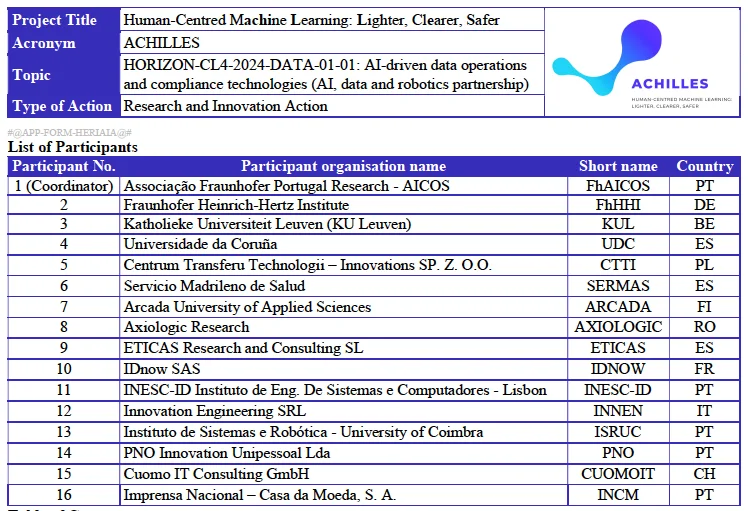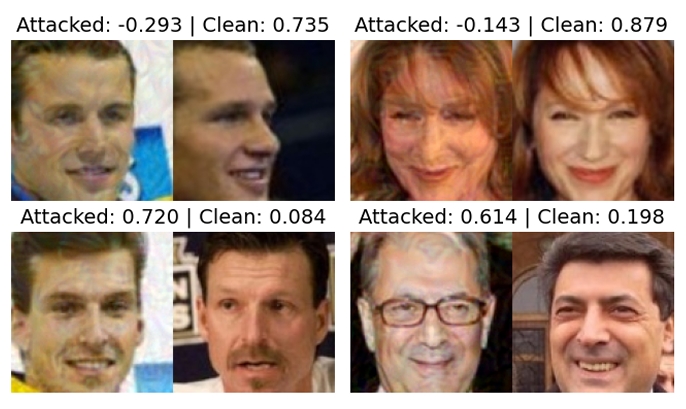
Results and Achievements
2024-07-16
Authors: VisTeam
We are thrilled to announce that ACHILLES Project, a project where VisTeam (ISR-Coimbra) participates in, was approved to be financed by Horizon Europe, in a total budget for ISR-Coimbra of 470k€ (total eligible budget of the project is approximately 9.6M€). The ISR-Coimbra team will be leaded by Prof. Nuno Gonçalves.
ISR-Coimbra participation is related to the building of privacy-by-design learning models and a use case related to Biometrics.
The project has its main focus on building Deep Learning models that are more explainable, fair, demographically balanced and with data whose sources are perfectly identified, with more security and privacy. This project aims to build the foundations for auditability of Deep Learning algorithms, one of the focuses of the European Commission regarding the AI Act.
The consortium is led by Fraunhofer Portugal and has a total of 16 participants.
A brief description about ACHILLES Human-Centred Machine Learning: Lighter, Clearer, Safer:
Inspired by the Olympic motto “Citius, Altius, Fortius” (Faster, Higher, Stronger),
ACHILLES delivers a modular framework for developing ML-based systems that are Lighter, Clearer, and Safer, inherently aligned with a broad spectrum of compliance requirements:
Lighter: ACHILLES strives for sustainable AI systems by promoting less data-intensive and energy consuming models without compromising output quality, in alignment with the European Green Deal.
Clearer: ACHILLES underscores transparency and explainability, critical for ethical compliance, aligning with the European Approach to AI’s focus on ethical principles, accountability, and trustworthiness.
Safer: ACHILLES commits to improving robustness, safety, and reliability in ML applications, ensuring the legal and technical compliance necessary for the safe integration of AI solutions across various sectors.
ACHILLES adopts an iterative cycle inspired by the phased approach of clinical trials, from preclinical explorations to post-market surveillance. This cycle addresses different stages (as seen in Figure 1):
Human-centric (start): prioritizing the human perspective, this stage employs value-sensitive design to involve users from the outset, breaking ground for AI that aligns with human values and regulatory expectations.
Data-centric: this stage tackles data quality, bias, synthetic data generation, and interpretable concepts, ensuring compliance with regulations like GDPR and addressing privacy and security concerns.
Model-centric: here, ACHILLES aims to improve training efficiency and privacy-preserving methodologies, such as federated learning.
Deployment-centric: this stage emphasizes energy efficiency in the deployment stage, offering techniques to minimize energy consumption and optimise models for existing infrastructure.
Human-centric (end): the cycle recentres on the human perspective, underscoring human-AI interaction and agency. This encompasses explainability, continuous monitoring, and transparent reporting through augmented data and model cards, akin to drug leaflets in the clinical trials analogy.
We also propose an ACHILLES Integrated Development Environment (IDE) that aims to be a new standard for machine learning development by providing a comprehensive framework empowering scientists, developers, and engineers to embed the project’s vision into AI products seamlessly, making the right thing the easiest thing to do. By incorporating these principles, ACHILLES contributes to the three pillars of a robust compliance framework by: a) studying and advancing current compliance targets in legal, ethical, and sustainability domains; b) providing technical modules and a specialized IDE to promote best practices and seamless adherence to targets; and c) methods to verify compliance, through exhaustive and transparent reporting. ACHILLES seeks to help creating efficient, transparent, and trustworthy-by-design AI solutions that empower human-centred decision-making while addressing the complex challenges of AI’s societal impact with a focus on sustainability and ethical integrity.
This project has received funding from the European Union’s Horizon Europe research and innovation programme under Grant Agreement No 101189689.


© 2024 VISTeam | Made by Black Monster Media

Institute of Systems and Robotics Department of Electrical and Computers Engineering University of Coimbra